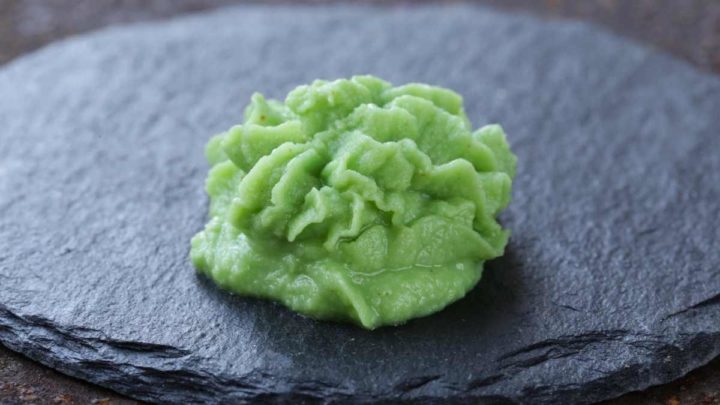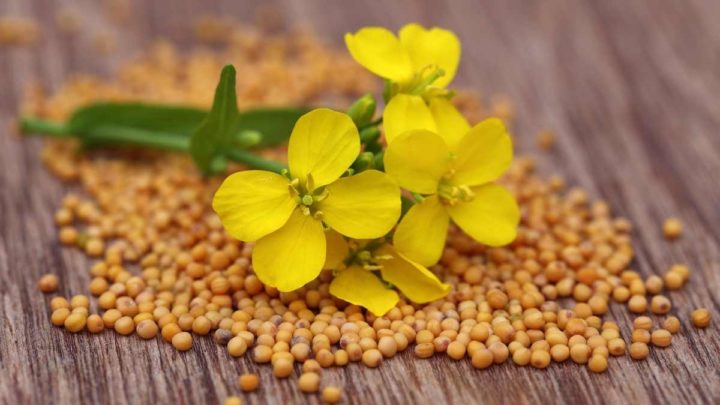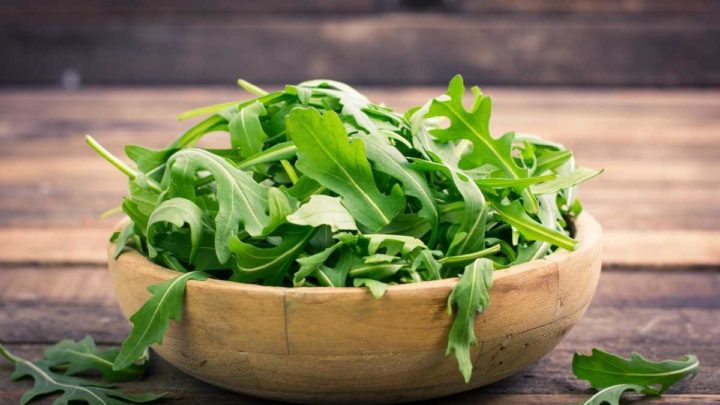Mustard powder is a staple in the kitchen. It adds flavor and color to dishes, but it can cause allergy on your skin if you are not careful. Also, this is always out of stock in most grocery stores because of its popularity. Luckily there are many alternatives that will give you all of the same great flavors without any of the bad effects! Here are the best mustard powder substitutes that work well in almost anything.
You may also be interested in
What Are the Best Mustard Powder Substitute
1. Arugula
Arugula is a common substitute for mustard powder. The leaves add a peppery kick with just enough heat to make them interesting. They also look pretty cool when sprinkled over salads. You can use arugula as an alternative to mustard powder because they both contain similar amounts of salt. However, arugula has more moisture than most other mustards so it will not leave behind as much residue after cooking. This makes it easier to clean up from spills.
when substituting arugula from dry mustard powder, you have to finely chop the leaves. Then mix 1/4 cup of chopped arugula into 2 cups of boiling water until wilted. Let sit for at least 3 minutes before straining out the solids. Use this liquid instead of regular mustard in recipes like salad dressings, sauces, soups, etc. It might not have the yellow color but the texture and flavor are the best!
2. Prepared Mustard
Prepared mustard is another excellent substitute for those who want something different. There are several varieties available including Dijon, honey mustard, spicy brown, sweet & hot, barbecue sauce, and others. These products usually come pre-mixed and ready to go. Some even include spices such as garlic, onion, pepper, celery seed, chili flakes, and more. All these ingredients combine together to create one delicious product.
When substituting, you only need to use 1 tablespoon of prepared mustard for every 1 teaspoon of mustard powder. This is because prepared mustard is highly concentrated and might be too much for the dish.
3. Mustard Seed
Another popular choice among people looking for mustard powder replacement is brown mustard seeds. Like the mustard powder, mustard seeds come from different types of a mustard plant and provides a tangy taste and bright yellow coloring. They do however require some extra preparation time. To get started, soak 4 tablespoons of whole mustard seeds overnight in 3 cups of warm water. In the morning drain off the soaking solution and rinse the seeds under cold running water. Dry thoroughly by patting the seeds between paper towels. Once dried, grind the seeds using a mortar and pestle or coffee grinder. Store ground mustard seeds in an airtight container away from light. When making a recipe, simply measure out how much dry mustard seed you would normally use and then replace it with equal parts of ground mustard powder.
4. Wasabi Powder
Wasabi powder is made from wasabi root which gives it its unique pungent flavor. It comes in two forms: paste and powdered form. Both versions provide a strong punch of spice that works perfectly in Asian dishes, especially for Japanese food like sushi, sashimi, and dipping sauces. Since it contains no MSG, it is safe for anyone with food allergies.
When using wasabi powder to substitute for mustard, make sure to only use half a teaspoon per 1 tablespoon of mustard powder. But if you want your favorite recipes to have a more spicy flavor, add another half teaspoon of wasabi.

5. Turmeric Powder
Turmeric has been used since ancient times for medicinal purposes. Today turmeric powder still remains an important ingredient in many dishes, especially in Asian cuisine. If you do not have the regular mustard powder available with you, just use the most common way to prepare turmeric. Roast it first so that all the volatile oils can evaporate. After roasting, the turmeric becomes very fragrant and flavorful. Grind all of them using a food processor. Make sure that they are finely grounded until no bumps or large pieces are left. You can also purchase roasted turmeric powder at specialty stores. If you do not find any, just buy plain turmeric powder and follow the same steps above.
It is an excellent substitute for dry mustard powder because both contain similar flavors with mustard flavor, without making your dish distasteful. The best part about this substitution is that there is no limit on how much you can use. Just remember to start with ½ teaspoon of turmeric powder for each ¼ cup of mustard powder. Then gradually increase the amount based on personal preference.
Can can I use instead of Fenugreek?
6. Horseradish Powder
Horseradish powder is one of those spices that everyone loves but few know what exactly makes it special. This spice originates from Europe where horseradish grows well. Its roots grow underground and when harvested, they are peeled and cut into small cubes before drying. Dried horseradish is usually stored in jars and sold as a powder. While horseradish powder does not give the sharpness of fresh horseradish, it adds a nice kick to foods such as soups, stews, salads, sandwiches, etc.
To create a perfect substitute for mustard powder, mix together 2 teaspoons of horseradish powder with 1/3 cup of white vinegar. Let sit for 5 minutes before adding salt and pepper to taste. Use this mixture instead of mustard powder whenever needed.

7. Dijon Mustard (French Mustard)
Dijon mustard is also known as French mustard. It is prepared differently than American-style mustards. Instead of being cooked down, French mustards are aged longer and mixed with wine vinegar. As a result, their color turns darker while maintaining their original flavor. There are three main varieties of dijon mustard; grainy, smooth, and honey. Grainy mustard is often referred to as “American” style mustard. Smooth mustard is milder and sweeter compared to grainy mustard.
Given that point, most people use Dijon mustard as a good substitute for regular yellow mustard powder because its flavor profile resembles that of mustard powder. However, some may prefer the sweetness of smooth mustard over the bold flavor of grainy mustard. To get around this problem, simply combine equal parts of grainy and smooth mustard powders. For example, 3 tablespoons of grainy mustard + 6 tablespoons of smooth mustard 9 tablespoons total. Mix these two types of mustard together thoroughly before storing them in an airtight container.
8. Caraway Seeds
Caraway seeds come from the carvi plant which belongs to the carrot family. They are native to central Asia and were originally cultivated by the Romans. In fact, the word caraway comes from Latin meaning ‘caro’ which means ‘to love’. These tiny black seeds add a unique aroma to various dishes. It is also one of the most convenient options as an alternative to mustard powder.
When substituting, just use the same amount as the regular mustard. It does not destroy the overall flavor of the food. But if you want to make it spicier, you have to add chili or cumin to achieve it.

9. Stone Ground Mustard
Stoneground mustard has been used since ancient times. It was first discovered in Egypt during the reign of Ramses II. Since then, stone grinding has become more popular among chefs due to its superior quality. Unlike other forms of mustard, stone ground mustard contains only whole grains. Therefore, it retains all nutrients found within the seed including protein, fiber, minerals, vitamins, and antioxidants. It gives a flavor of nutty notes without any bitterness at all.
This substitute is great for salad dressings and marinade, without giving overpowering flavors. Just use a 1:1 ratio, the same amount you use for a mustard sauce or powder.
10. Whole Grain Mustard
Whole grain mustard can be made using either brown or red wheat berries. The difference between the two lies in how they are processed after harvesting. Brown wheat berries contain bran and germ whereas red ones do not. It is one of the best dry mustard substitutes because it gives a similar flavor to Dijon, especially when used as an ingredient in meats and dressings.
So if you want to use this as a mustard powder substitute, you only need to follow the 1:1 ratio. You will still end up getting the desired results. If you want to go further, try adding spices like garlic, ginger, turmeric, etc.
Related Questions
Can you substitute English mustard for mustard powder?
Yes. You just have to put 1 tablespoon of English mustard for every 1 teaspoon of ground mustard.
How do you make mustard powder?
You can buy ready-made mustard powder online but we recommend making your own. Simply toast the dry mustard seeds for at least 15 seconds in a skillet. Let it dry and transfer them into a food processor or spice grinder. Grind until turned into powdered form. To ensure a smooth texture, use a strainer.
Can you substitute mustard for mustard powder?
No. Both mustards are different products with their own distinct uses. While the mustard powder is usually added to sauces and spice blend, a mustard paste is often used on sandwiches and salads. So if you want to replace the mustard powder with mustard paste, you should look for another product instead.
Is English mustard powder the same as ground mustard?
English mustard powder simply comes from the same type of mustard seed that has gone through a different refining process.
Is white mustard different from and yellow mustard?
White mustard is prepared from unripe mustard seeds while yellow mustard is made from mature seeds. White mustard is milder than yellow mustard. Yellow mustard is stronger and adds a tangy taste to foods.